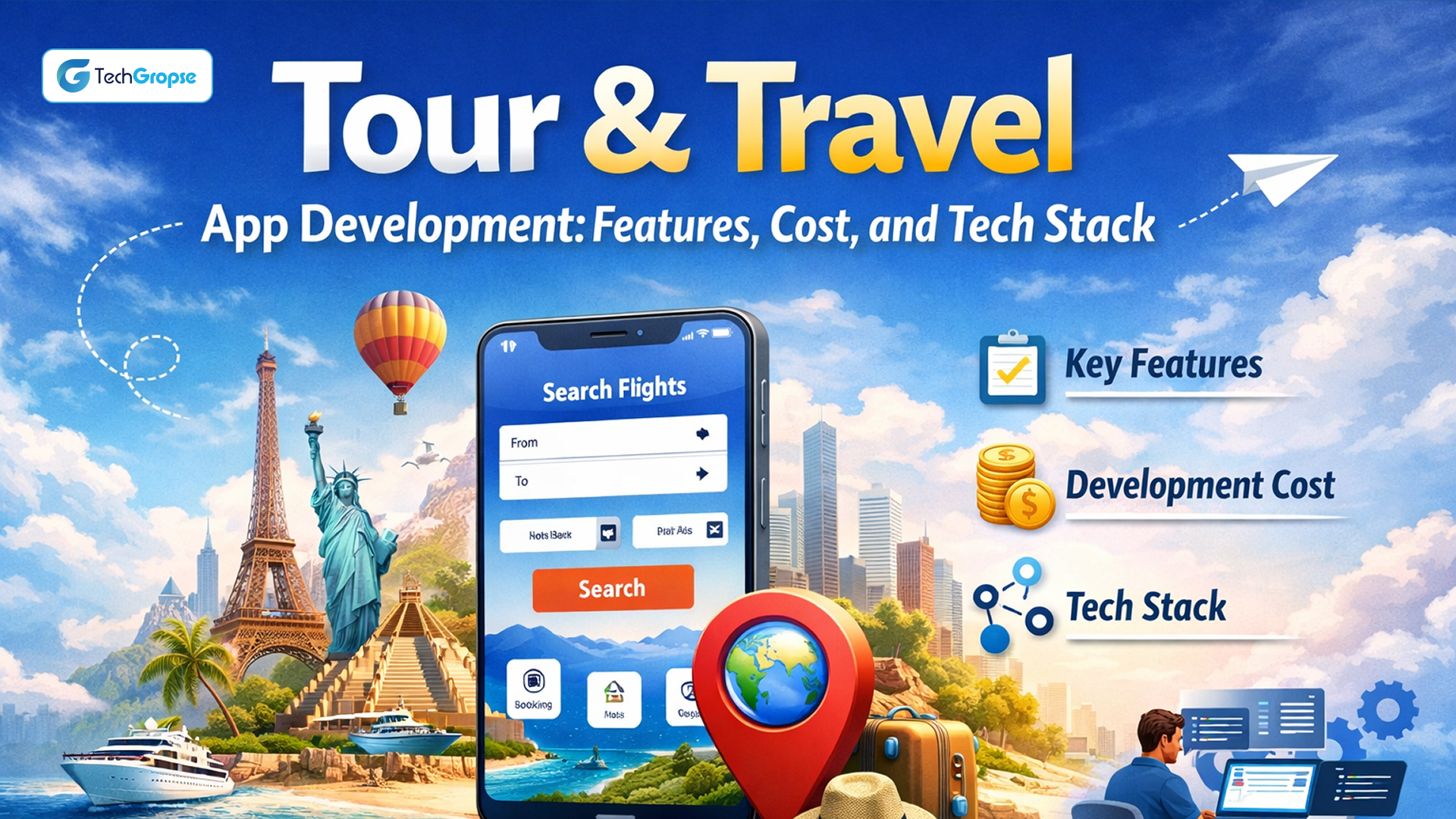Do you want to dive into the future of technology? Explore the fascinating world of blockchain development in the metaverse and witness a revolution that is redefining our digital landscape. Get ready to explore the role of blockchain developers in Metaverse for limitless possibilities.
The Metaverse is a new concept that’s gaining popularity and is expected to change the way we interact with digital content.
As technology advances, the Metaverse becomes more realistic and accessible, creating opportunities for developers and users. Blockchain technology is becoming increasingly important in the Metaverse.
In this post, we will explore the intersection of blockchain and the Metaverse, and evaluate the vital role of blockchain developers in this digital world.
What is Blockchain Technology?
Blockchain technology is like a digital ledger, you can imagine it as a magical, pocket diary for the internet. Instead of one person holding the diary, it’s shared with many who agree on what’s written.
Every new information, or “block,” is linked to the previous one, creating an unbreakable chain. This digital diary is super secure because changing one entry means changing every entry before it – and everyone in the chain would notice.
It is decentralized, so no single person or entity controls it. It is like a community-powered, tamper-proof record-keeper, making sure information stays honest and safe in the vast online world.
Also Read, https://www.techgropse.com/mobile-app-development-company-chicago
What is Metaverse Technology?
The Metaverse is like a digital wonderland, a space where the online world becomes an immersive, interconnected experience. Now, let’s unravel the magic of Metaverse technology.
Imagine a place beyond your computer or phone screen, where you are not just a spectator but an active participant in a vibrant, 3D universe. Metaverse technology is the wizardry that makes this possible. It’s a blend of virtual reality, augmented reality, and another futuristic tech, creating a space where digital and physical realities dance together.
In simple terms, Metaverse technology lets you step into a virtual world, interact with others, and explore limitless possibilities. It’s not just about playing games; it’s about socializing, working, learning, and creating in a space that feels as real as the physical world – sometimes even more exciting!
Think of it like a gateway to a parallel universe, where you can be anyone or anything you want. Metaverse technology is the key to unlocking this portal, ushering you into a realm where your digital adventures come to life.
So, buckle up as we dive into the enchanting universe of Metaverse technology, where the boundaries between imagination and reality blur into pure, exhilarating magic!
What are the Market Trends of Metaverse?
- 2024 Market Value: $74.4bn
- CAGR (2024-2030): 37.73%
- Projected 2030 Market Volume: $507.8bn
- Top Value Generator (2024): United States – $23.0bn
- Projected 2030 Users: 2,633.0 million
- User Penetration (2024): 14.6%, Expected to increase to 39.7% by 2030
- Average Value per User (ARPU): $79.5
- Global Potential: The Metaverse market is on fire worldwide, with standout performers like the United States, China, and Japan leading the charge in tech and user adoption.
Why Blockchain is Essential for the Metaverse?

Blockchain is like the secret sauce for the Metaverse, and here’s why. Imagine the Metaverse as a gigantic digital playground where people hang out, play games, and do all sorts of cool stuff.
Now, to make sure everything is fair, secure, and transparent in this virtual world, we need a technology that’s as trustworthy as your best friend. That’s where blockchain struts in.
Blockchain is like the digital sheriff, keeping things in check. It ensures that virtual assets, like that killer spaceship you earned in a game, are truly owned by you and can’t be swiped by some sneaky virtual bandit. It also guarantees transparency, so everyone knows the rules of the game and nobody can cheat.
So, in the Metaverse, where people are buying, selling, and trading digital goodies, blockchain is the superhero tech that makes it all work smoothly and securely. It’s not just a key; it’s the guardian of fairness and trust in the fantastical world of the Metaverse.
Also Visit: Mobile App Development Company in Dubai
What are the Opportunities for the Metaverse With Blockchain?
Blockchain plays a pivotal role in shaping the Metaverse, acting as the invisible architect that ensures a secure, transparent, and interconnected virtual realm.
Here’s a breakdown of the key role of blockchain developers in Metaverse:
Decentralized Transactions
- Blockchain facilitates secure and transparent transactions within the Metaverse.
- It ensures that virtual assets, currencies, and goods can be exchanged seamlessly without the need for intermediaries.
Smart Contracts
- Smart contracts, self-executing agreements written in code, automate processes within the Metaverse.
- Blockchain enables the creation and execution of these contracts, ensuring trustless and efficient user interactions.
Decentralized Identity Management
- Blockchain provides a secure framework for decentralized identity management.
- Users can control and protect their identities across different virtual worlds, reducing the risk of identity theft within the Metaverse.
Interoperability
- Blockchain fosters interoperability among various platforms and virtual environments.
- It allows for seamless communication and asset transfer between different parts of the Metaverse, creating a cohesive and interconnected experience.
Scarcity and Ownership
- Blockchain ensures the scarcity and ownership of virtual assets.
- Through unique digital identifiers and provenance tracking, users can truly own and trade scarce digital items within the Metaverse.
Security Measures
- Security is paramount in the Metaverse, and blockchain provides a robust defense.
- Advanced cryptographic techniques and consensus mechanisms protect the integrity of the virtual realm, preventing unauthorized alterations.
Scalability Solutions
- If you hire blockchain developers, they ensure to address scalability challenges within the Metaverse.
- They devise solutions to accommodate the growing user base and ensure smooth, lag-free experiences in expansive virtual environments.
Future Developments with AI
- The integration of artificial intelligence (AI) into the Metaverse is evolving.
- Blockchain developers will play a crucial role in developing AI-powered solutions that enhance user experiences, personalizing interactions within the virtual space.
Virtual Economies
- Blockchain underpins virtual economies within the Metaverse.
- It ensures fair and transparent distribution of virtual assets, fostering a thriving marketplace and attracting a diverse user base.
Learn More: Top Mobile App Development Companies in Saudi Arabia
What Does a Blockchain Developer Do?

A blockchain developer is a tech-savvy architect of the digital realm, responsible for designing, implementing, and maintaining the intricate structures that underpin blockchain technology. The role of blockchain developers in Metaverse is multi-faceted, combining coding prowess with a deep understanding of decentralized systems.
Here’s a breakdown of why you should hire blockchain developers:
Blockchain Protocol Development
- Network Architecture: Blockchain developers in Metaverse build the architecture of the network, choosing or creating the protocol that governs how the network operates.
- Consensus Mechanisms: They implement consensus mechanisms, determining how participants agree on the state of the blockchain, ensuring a trustless and decentralized environment.
Smart Contract Development
- Creating Code Logic: Blockchain developers design and implement smart contracts, self-executing pieces of code that automate and enforce agreements within a blockchain network.
- Security Implementation: They ensure the smart contracts are secure, free from vulnerabilities, and tamper-proof, preventing unauthorized alterations.
Decentralized Application (DApp) Development
- Front-End and Back-End Coding: Blockchain developers in Metaverse create DApps, decentralized applications that interact with blockchain networks. This involves both front-end (user interface) and back-end (smart contract integration) development.
- User Experience Optimization: They work to enhance the user experience within DApps, ensuring seamless integration with blockchain functionalities.
Cryptographic Implementation
- Ensuring Security: Blockchain developers employ cryptographic techniques to secure transactions, wallets, and communications within the blockchain ecosystem.
- Addressing Vulnerabilities: They continuously monitor and address potential cryptographic vulnerabilities to maintain the integrity and confidentiality of data.
Consensus Algorithm Optimization
- Scalability Solutions: Developers address scalability challenges by optimizing or implementing consensus algorithms, ensuring the blockchain network can handle a growing number of transactions.
- Performance Enhancement: They work to enhance the overall performance and efficiency of the blockchain network, minimizing transaction confirmation times and reducing resource consumption.
Integration of Blockchain with Other Technologies
- Cross-Platform Compatibility: An ideal blockchain development company integrates blockchain technology with other platforms, ensuring compatibility and interoperability.
- API Development: They may develop APIs (Application Programming Interfaces) to facilitate communication between blockchain networks and external systems.
Blockchain Network Maintenance
- Node Management: Developers are responsible for maintaining and managing blockchain nodes, ensuring the health and stability of the entire network.
- Software Updates: They implement software updates and patches to address bugs, enhance security, and introduce new features to the blockchain.
Troubleshooting and Debugging
- Identifying Issues: Blockchain developers diagnose and resolve issues within the blockchain network, troubleshooting bugs and errors.
- Continuous Improvement: They contribute to the ongoing improvement of the blockchain system, learning from challenges and evolving the technology.
What are the Key Advantages of Becoming a Blockchain Developer?
Working as a blockchain developers in Metaverse comes with a myriad of benefits, reflecting the dynamic and growing nature of this field.
Here’s a comprehensive look at the advantages that come with choosing a career as a blockchain developer:
1. In-Demand Skills
Blockchain developers are in high demand as businesses and industries increasingly adopt blockchain technology. This demand offers various job opportunities and competitive salaries.
2. Innovative Technology Exposure
Blockchain is at the forefront of technological innovation. As a blockchain developer, you are at the cutting edge of a transformative technology, constantly exposed to new and exciting developments.
Blockchain development in Metaverse is not limited to cryptocurrencies. Developers have the opportunity to work on diverse projects, including decentralized finance (DeFi), non-fungible tokens (NFTs), supply chain management, and more.
3. Global Collaboration
Many blockchain projects are open source, fostering a global community of developers. This collaborative environment allows for knowledge-sharing and networking on a global scale. The nature of blockchain development often allows for remote work, providing flexibility and the opportunity to collaborate with professionals worldwide.
4. Competitive Salaries
Due to the high demand and specialized nature of blockchain development, professionals in this field often enjoy competitive salaries and attractive compensation packages.
5. Continuous Learning and Growth
Blockchain technology evolves quickly, requiring developers to stay on top of industry trends and updates. This constant learning ensures ongoing professional development. Hire dedicated developers who have diverse skills that include smart contract development, cryptography, consensus algorithms, and more, enhancing their overall versatility.
7. Entrepreneurial Opportunities
The blockchain space is fertile ground for start-ups and innovative projects. Developers have the chance to be part of groundbreaking initiatives and even launch their ventures. Blockchain developers contribute to the creation of systems that have the potential to reshape industries and redefine how transactions, data, and assets are managed.
8. Security and Trust
Blockchain’s reliance on cryptographic techniques and decentralized consensus mechanisms ensures a high level of security, providing developers the opportunity to contribute to building robust and trustful systems. Blockchain, with its emphasis on transparency and security, has the potential to positively impact society, from financial inclusion to supply chain transparency.
Challenges and Opportunities for Blockchain Developers in Metaverse

As with any emerging technology, blockchain developers in the metaverse face their fair share of challenges and opportunities.
- One major challenge is overcoming scalability and performance issues. The metaverse is expected to be a vast and interconnected virtual world, which means handling a massive amount of transactions and interactions. Developers need to find innovative solutions to ensure smooth and efficient operations within the metaverse.
- Another challenge is ensuring security and privacy in the metaverse. With the metaverse being built on a decentralized infrastructure, developers must design robust security measures to protect users’ identities, digital assets, and transactions.
- Privacy concerns also come into play, as users may not want their every move in the metaverse tracked. Striking the right balance between security and privacy will be a crucial task for blockchain developers in Metaverse world.
Case Studies: Successful Implementation of Blockchain in the Metaverse
Let’s take a look at two case studies that demonstrate the successful implementation of blockchain technology in the metaverse.
Case Study 1: Blockchain Integration in Virtual Real Estate
In this case, blockchain technology was used to establish a decentralized marketplace for virtual real estate within the metaverse. Users could buy, sell, and trade virtual properties securely, with ownership records immutably stored on the blockchain. This introduced transparency, trust, and liquidity to the virtual real estate market, enabling users to truly own and monetize their digital properties.
Case Study 2: Blockchain-Based Digital Asset Ownership
In this case, blockchain was utilized to provide verifiable ownership of digital assets within the metaverse. By tokenizing digital assets and recording ownership on the blockchain, users had complete control and proof of ownership over their unique virtual items. This not only enhanced the value of digital assets in the metaverse but also enabled seamless transfer and exchange of these assets among users.
Future Outlook: The Evolving Role of Blockchain Developers in the Metaverse
Looking ahead, the role of blockchain developers in the metaverse is poised to evolve alongside emerging trends and innovations.
As the metaverse expands and evolves, developers will need to adapt and stay up-to-date with new technologies and standards. You must hire metaverse developers who are likely to focus on interoperability, enabling different virtual worlds and platforms to interact seamlessly. Expected growth and opportunities for blockchain developers in Metaverse are substantial.
As more industries and sectors explore the potential of the metaverse, demand for skilled blockchain developers will increase.
Developers who can create scalable, secure, and immersive experiences within the metaverse will be in high demand, presenting exciting career prospects for those in this field. So, put on your virtual coding gloves and get ready to shape the metaverse of tomorrow!
Final Thought
The convergence of blockchain solutions in Metaverse presents a myriad of opportunities and challenges for developers.
As the Metaverse continues to grow and evolve, blockchain developers will play a crucial role in shaping its future.
Developers can help create safe and immersive experiences in the Metaverse by possessing the necessary skills, expertise, and understanding of blockchain programming languages.
It involves programming in a decentralized manner to ensure security. By doing so, they can contribute to building a decentralized and secure Metaverse.
As we look ahead, it is clear that the role of blockchain developers in Metaverse will continue to expand, creating exciting possibilities for innovation and collaboration in this virtual universe.
FAQ: Evaluate the Role of Blockchain Developers in Metaverse
1. What is the Metaverse and how does it relate to blockchain technology?
The Metaverse refers to a virtual universe where individuals can interact with each other and digital environments. Blockchain technology plays a significant role in the Metaverse by providing a secure and decentralized infrastructure for various activities, such as tokenized asset ownership, decentralized governance, and secure transactions.
2. What specific skills and expertise are required for blockchain developers in Metaverse?
You need to hire blockchain developers in USA who have a solid understanding of blockchain technology. They should have proficiency in blockchain programming languages such as Solidity or Rust, knowledge of smart contracts, and decentralized applications (DApps), and the ability to address scalability, performance, and security challenges specific to the Metaverse.
3. How can blockchain developers contribute to the growth and development of the Metaverse?
Blockchain developers can contribute to the growth and development of the Metaverse by creating and implementing innovative blockchain solutions. They enhance the user experience and enable secure ownership and management of digital assets. It ensures transparency and trust in transactions and addresses scalability and performance issues within the virtual environment.
4. What are some challenges faced by blockchain developers in Metaverse?
Blockchain developers in the Metaverse face challenges related to scalability, performance, security, and interoperability. They need to find solutions to manage a large volume of transactions and ensure fast and efficient processing. They maintain the security and privacy of user data and enable seamless interaction and interoperability between different virtual worlds and platforms.













